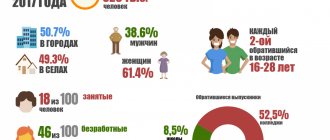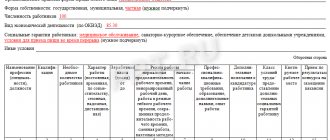The Employment Law belongs to the federal group of laws. It regulates the work of a specialized government agency, explains the rights of citizens and employers in the field of employment, and also guarantees social protection and support for Russians who cannot find work.
Along with other federal laws, the Employment Law forms the basis of the country’s legislation
The legislative act was adopted in 1991, but over almost 30 years it has undergone many changes, additions and amendments. There are seven chapters in total, of which only six are in effect. The last chapter on monitoring the implementation of the law has become invalid.
On a note! According to the law, persons who are employed under civil or labor contracts, conduct business activities, are founders of organizations, undergo full-time training in educational institutions, serve in the army, and temporarily disabled citizens on leave are considered employed.
General characteristics: goals and purpose
Since January 1, 2021, several bills have come into force that relate to employment and registration with employment centers.
The changes also affected the law on the employment of citizens. Important! All citizens who registered with the center before January 1, 2021 are issued benefits in the original amount, as well as according to the old scheme specified in the old version of Law No. 1032-1 (on employment).
For those individuals who apply for funds from January 2019 inclusive, payment is made according to the new rules, which are regulated by the introduced amendments.
The law itself remains in force and fully regulates all the norms and rules for finding persons in unemployed status.
Most of the amendments were introduced to implement an increase in the retirement age and support the least protected segments of the population, as well as to increase the amount of benefits during unemployment.
Law of the Russian Federation of April 19, 1991 No. 1032-1 “On employment in the Russian Federation”
Latest changes in the employment law
It is worth noting that the first changes to Federal Law No. 1032-1 occurred in the last century, when Federal Law No. 36 dated April 20, 1996 saw the light of day. It was decided to review the basic norms and requirements of the law in December 2016. It changed two more times: in May and July 2021, and the latest changes to the law were made by Federal Law No. 461 of December 11, 2018.
About orphans
In particular, additional guarantees for orphans who are getting a job for the first time deserve attention.
For 6 months after registering with the Social Security Fund, they can count on financial support in an amount equal to the average salary in the region of residence. After this period, children left without adult care until they are employed or reach the age of 23 are paid unemployment benefits according to the minimum wage.
About unemployment
The changes also affected the unemployed, or rather the provisions on the recognition or non-recognition of representatives of certain categories as such.
In particular, teenagers under the age of 16, as well as Russians who have retired due to age or length of service, cannot be officially recognized as unemployed. Those who refused two job offers within 10 days will not receive unemployed status.
Citizens of Russia who are looking for work for the first time, but have refused two offers of vocational training or ignored two offers of work, cannot claim the status of unemployed. Citizens sentenced by a court to imprisonment or correctional labor also cannot be called unemployed. Persons who have committed forgery of documents and employed citizens are also deprived of state support.
How unemployment benefits are paid
Payment of benefits for laid-off employees begins from the moment of their official dismissal upon application, and for unemployed people registered with the Central Workers' Office, from the moment they are assigned the status of unemployed.
The benefit payment period is no more than 12 months per year and a half. If a citizen has not found a job within 18 months, the period for payment of benefits is extended, but with the condition that only 2 years of being in unemployed status will be paid for three years.
In conclusion, I would like to note that the law, adopted in the difficult conditions of the 90s, regulated the situation in the labor market, which was previously ruled by lawlessness and lack of rights for hired workers, whose wages were even delayed, paid in food, clothing, or left without wages at all. Today, even if you find yourself without a job, a person feels the support of the state, and this is especially important, given the difficulties associated with losing a job.
(
14 ratings, average: 5.00 out of 5)
Rights and obligations of the parties to the employment process
The employment process remained the same after the changes were adopted. Each party to the process has its own rights and obligations. This applies both to a person without a job and to a government support body, which is the employment service.
Employment services
A government agency has special rights and responsibilities. In general, responsibilities include the following:
- carrying out a job search and further employment of a citizen;
- material support for citizens during the period of job search;
- implementation of guarantees provided by the state to all persons.
Important! The employment service may refuse payments and employment assistance if it has grounds for doing so.
The government body also has the right to terminate financial assistance if this is in accordance with the legislative framework.
Read also: Traffic police fine from camera
Employers
There are several responsibilities for employers.
Among them is the constant provision of reporting on personnel and employees to the control body. Also, during layoffs, the employer must make established payments. If there are available vacancies, information on them is transmitted to the regional center for the selection of candidates. It is important to remember that every employer has the right to set qualification restrictions for employees.
Applicants
The main responsibility of the applicant is to fully comply with the rules for being in the received status and actively participate in the job search. At the same time, in the absence of violations, including passive unregistered income, individuals have the right to financial assistance from the state, as well as to various guarantees that are provided to different categories of applicants.
Employment of disabled people
Federal Law No. 476 introduced a new article 13.1 into Federal Law No. 1032-1, which describes the process of support when assisting in the implementation of employment of disabled people.
So, according to the new article:
- The state is obliged to provide assistance to disabled people who need it in finding employment and adapting to the workplace.
- Assistance or accompaniment is the provision of individual assistance in finding employment, adaptation of a disabled person in the workplace, creating an accessible environment for the disabled person to move to and from the workplace.
- Programs for professional support for people with disabilities are included in regional programs to promote employment.
- The executive authorities of the constituent entities of the Russian Federation, which are responsible for the program to support people with disabilities in professional activities, must develop a program of activities for support, inform employers about the program , work with medical and social experts, carry out career guidance, training, and retraining of citizens with disabilities.
- The employment service must individually develop a support program for each disabled person , based on rehabilitation and habilitation programs.
- The organization of an accessible environment so that people with disabilities can get to the workplace can be carried out by non-governmental organizations (for example, foundations) under an agreement with the employment service.
- Employers participating in the program can assign mentors for a disabled employee (at the request of the employees) from among more experienced employees who can help the disabled person get comfortable and make timely suggestions on the conditions for the disabled person’s work to management.
Unemployed status
Citizens can obtain status only after applying to a special state-type body (CZ). In this case, several conditions will need to be met, including:
- do not have a job and are looking for a job;
- be registered and comply with all rules for being there;
- be able to work.
If a person has lost his job, then to obtain status he will need to provide all the necessary documents.
Registration procedure
The registration procedure is standard.
First, a citizen registers after losing his job. This is only possible if all requirements are met and there is actually no income.
To register, you must provide all documents, including employment and 2-NDFL.
After reviewing the documents, the service registers the unemployed person and begins looking for a job for him.
Amount of cash payments
The amendments establish new terms and amounts of benefits.
Citizens who have an employment relationship of at least 26 weeks over an annual period are paid 75% of the average monthly wage in the first three months. Next three months 60% of earnings are paid. For persons of pre-retirement age, the amounts are similar, except that after the 6th month the benefit remains at 45%. After amendments, the minimum amount is 1.5 thousand rubles, and the maximum is 8 thousand rubles. For pre-retirees, the amount is set at a maximum of 11,280 rubles. Regional coefficients apply for all categories.
In what cases do payments stop?
Benefit payments are terminated in several cases. List of reasons:
- the person has retired;
- the person is employed;
- the person violated the rules of being registered, for example, did not take part in the job search;
- The time for assistance has expired.
All these grounds legally terminate the support of persons in accordance with the established procedure.
Assistance to employers in the employment of disabled people
In Article 25 of Federal Law No. 1032-1, Federal Law No. 476 introduced a new obligation for employers to assist the state in providing employment to the population. Employers are now required to:
- prepare jobs for people with disabilities taking into account their needs;
- prepare an accessible environment for a disabled person to move to his workplace and other necessary premises;
- advise a disabled person when working remotely;
- provide an individual mode of operation , if necessary;
- provide a mentor from among its employees if necessary and at the request of employees.
Guarantees and compensations from the Employment Center
The Center ensures all guarantees provided by the state in relation to unemployed persons. Among the guarantees and compensations:
- financial assistance to family and dependents;
- payment of severance pay;
- compensation upon dismissal;
- compensation for moving expenses;
- making special payments for retraining and retraining;
- payment for public work.
All these guarantees are carried out by the regional center in which the person is registered.
Citizens' rights
The rights of able-bodied Russians in the field of employment are described in the second chapter of the Law, articles 8 to 11. Citizens can:
- Choose where to work (Chapter 2 Article 8). Look for work on your own or with the help of specialized government agencies.
Article 8. The right of citizens to choose a place of work
- Receive free advice on employment from service specialists regarding the choice of profession, education, etc.
- Work not only within the country, but also abroad.
- File a complaint if an Employment Center employee committed an unlawful act.
The state also guarantees that citizens have the right (Article 9):
- Receive financial protection from unemployment.
- Freely choose your profession and type of activity.
- Receive free assistance in finding employment from the public service.
To find a job, a citizen can use the free services of a specialized government agency
Additional guarantees for various categories of citizens
First of all, financial support is provided to the dependents of the unemployed. Also, various categories have their own additional guarantees, for example, for people of pre-retirement age.
Read also: Federal Law 161 on the national payment system
Any preferential category, as well as those who have regional benefits, receive larger payments. Additionally, for preferential categories, including pre-retirement workers, a priority right to vacancies and retraining is established.
What other guarantees are provided?
They are available to those citizens who encounter problems during employment. For this purpose the following are formed:
- Additional jobs for disabled citizens.
- Jobs in regions where there is a severe shortage in this regard.
- State support programs.
- If a citizen was fired by an individual entrepreneur due to staff reduction, then he is also entitled to certain benefits:
- Preservation of the queue to get housing.
- Free medical services when contacting institutions that provided services during work.
- Maintaining the opportunity to learn.
- Spouses of military personnel who have been transferred to the reserve receive an advantage in the employment process.
Unemployment of the Russian Federation
The difference between frictional and structural unemployment is very vague. The significant difference is that the “frictional” unemployed have skills that they can sell, while the “structural” unemployed cannot immediately get a job without retraining, additional training, or even a change of place of residence; Frictional unemployment is more short-term in nature, while structural unemployment is more long-term and therefore considered more severe. Kapelyushnikov R. Russian model of the labor market: what lies ahead? // Economic Issues. 2003. P.123.
About the legal category of employment, features and nuances
The level of involvement of able-bodied people in the country is a necessary condition for the normal balance of the main role of society - the reproduction of healthy, socially adapted offspring. all aspects of an individual’s life in society depend on the extent to which citizens are provided with jobs and, consequently, have a decent income, which is confirmed by the legislation on employment of the population of the Russian Federation:
- Indicators of people's level of well-being.
- The volume of costs for the selection of qualified personnel throughout the country.
- Opportunity for employment, material payments and adaptation of the unemployed to society.
Actually, the term “employment” means the whole variety of human activities, which allows one to satisfy personal and social needs without contradictions with the law and obtain certain labor income.
It is through employment in the creation of the gross social product that the most important aspect of the social development of the individual is revealed.
Which directly satisfies his needs for socially useful work and achievements associated with the results of labor.
This is interesting! Features of subsidies for housing and communal services: who is eligible?
Unemployment benefits: additional conditions
Such compensation is only available to citizens with official unemployed status. The employment service makes a decision on the payment of money simultaneously with the assignment of status. Accruals begin from the first day the basis appears.
If an employee is laid off, money is paid from the first day after such dismissal. Over the course of one and a half years, the total duration of payment cannot exceed 1.5 years. Or 24 months over three years. The payment period is extended if the citizen was not able to find a job during the first period.










